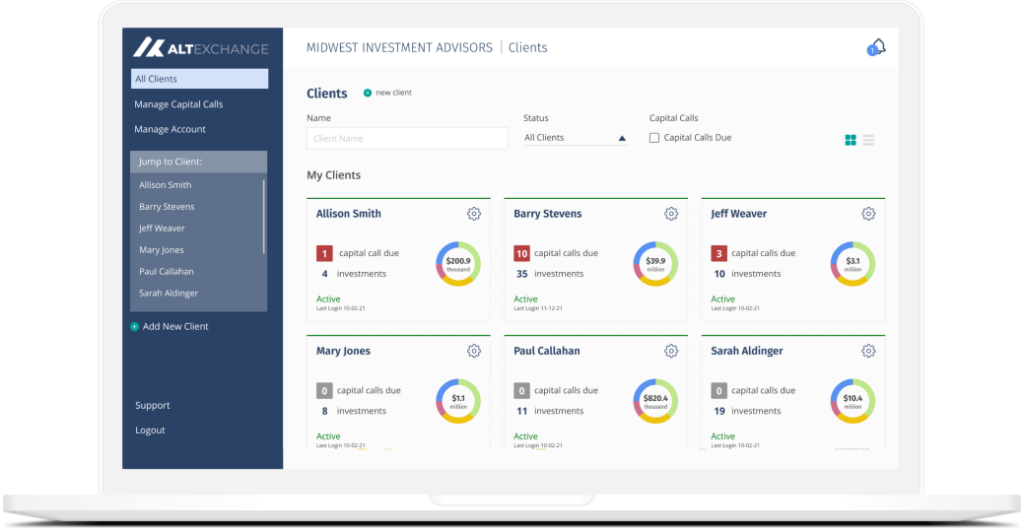As a financial advisor, it’s important to always look for ways to grow your business, stay competitive, and best serve your clients. One way to do this is by offering a breadth of alternative investment opportunities for your clients. Alternative investments can be a great way to expand your business, attract new clients, and best serve your current clients.
Here’s how financial advisors can offer alternative alternative investments and manage them in a streamlined, scalable way.

Liquid vs. illiquid alternative investments
First, let’s get into the basics. There are two main types of alternative investments: Liquid and illiquid.
Liquid investments are financial instruments that can easily be converted into cash. These types of investments typically have low levels of risk and can be liquidated quickly and with minimal transaction costs. Examples of liquid investments include stocks, bonds, mutual funds, government securities, money market accounts, and certificates of deposit (CDs). Examples of liquid alternative investments include cryptocurrencies, REITs, and NFTs.
Illiquid investments are financial instruments that cannot be converted into cash quickly. These investments typically require more time and higher transaction costs than liquid investments. Examples of illiquid investments include alternative investments such as real estate, private equity, venture capital, hedge funds, commodities, and derivatives. Real estate is a popular illiquid investment because it provides tangible assets.

Benefits of offering alternative investments to your clients
Financial advisors are not limited to traditional investments anymore. Through new technology and regulations, advisors can expand their clients’ portfolio offerings to a much wider variety of investment options.
One reason advisors should consider offering alternative investments is to help reduce risk and volatility in their clients’ portfolios. Additionally, alternatives can offer even further portfolio diversification, helping clients achieve their specific financial goals. And finally, some alternative investments, such as private equity and real estate, can actually hedge against inflation and market downturns like the conditions we’re experiencing right now.
Where to find alternative investment opportunities
There are a variety of ways to find alternative investment opportunities for your clients, depending on which ones you’re interested in offering. Liquid investments, like crypto or REITs, can be accessed through your regular brokerage account.

Illiquid investments, like real estate, private equity, hedge funds, and more can be a little more complicated. Certain investments, like private equity, may be limited to accredited investors, though access is increasing through new regulations and technology. There are also online platforms that allow access to private investments, such as Carta, Juniper Square, YieldStreet, and plenty more.
How to manage alternative investments
As allocation to alternative investments continue to grow, it’s imperative for advisors to have a streamlined, scalable solution to manage the complexities.

AltExchange eliminates common pain points of managing complex alternative investments including fragmentation, unstructured data, scattered documents, limited performance visibility, and more. If you’re an advisor, investor, or asset manager looking for a full-solution management and reporting solution for alternative investments, please get in touch.